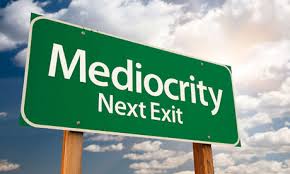记忆方法
1. Etymologically, mediocre means 'halfway up a mountain'.
2. medium => mediocre.
3. from medius "middle" + ocris "jagged mountain" (see acrid, acrobat, acrophobia).
4. acrid, acrobat, acrophobia => mediocre.
2. medium => mediocre.
3. from medius "middle" + ocris "jagged mountain" (see acrid, acrobat, acrophobia).
4. acrid, acrobat, acrophobia => mediocre.
中文词源
mediocre 普通的,平庸的
来自拉丁语mediocris,半山腰,中等的,普通的,来自medius,中间的,词源同middle,ocris,山峰,锯齿状高山,词源同acrobat,acrid.后词义进一步贬义化,形容平庸的,差劲的。比较其同源词mean.
英语词源
- mediocre
-
mediocre: [16] Etymologically, mediocre means ‘halfway up a mountain’. It comes from Latin mediocris ‘of middle height, in a middle state’, which was formed from medius ‘middle’ (source of English medium) and ocris ‘rough stony mountain’.
=> medium - mediocre (adj.)
- 1580s, from Middle French médiocre (16c.), from Latin mediocris "of middling height or state, moderate, ordinary," figuratively "mediocre, mean, inferior," originally "halfway up a mountain," from medius "middle" (see medial (adj.)) + ocris "jagged mountain" (cognate with Greek okris "peak, point," Welsh ochr "corner, border," Latin acer "sharp;" see acrid). As a noun, "medicore thing or person," by 1834.
权威例句
- 1. I thought the play was only mediocre.
- 我认为这部戏剧只是平庸之作。
- 2. The student tried hard, but his work is mediocre.
- 该生学习刻苦, 但学业平庸.
- 3. The critics condemned the play as mediocre.
- 评论家谴责那出戏为低劣产物.
- 4. Virginia was a perfectionist. She was just not prepared to settle for anything mediocre.
- 弗吉尼娅是个完美主义者,她根本不愿意拿任何普普通通毫无特色的东西将就。
- 5. Only lazybones and mediocre persons could hanker after the days of messing together.
- 只有懒汉庸才才会留恋那大锅饭的年代.

